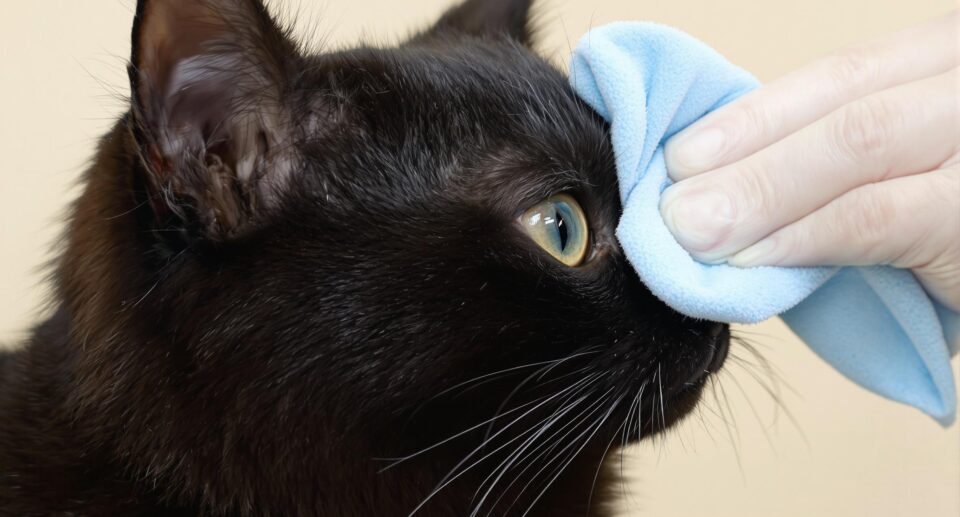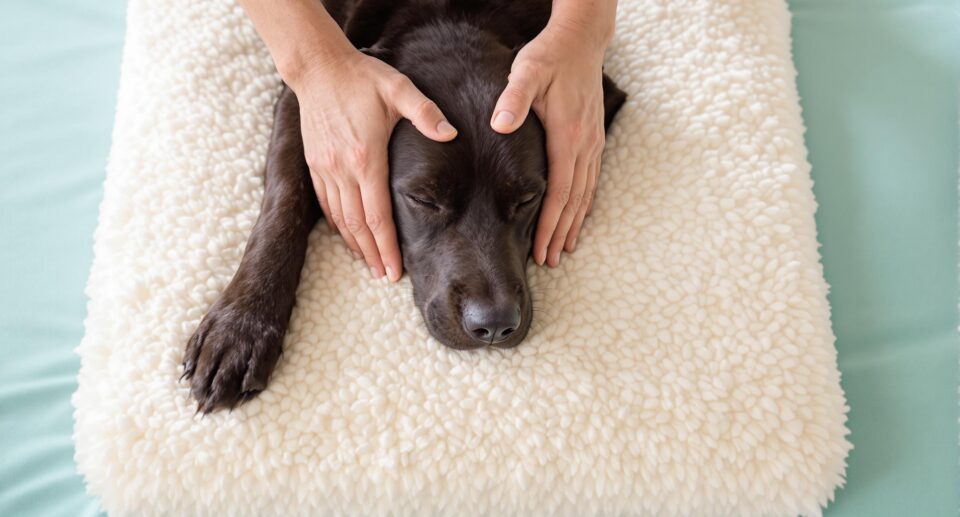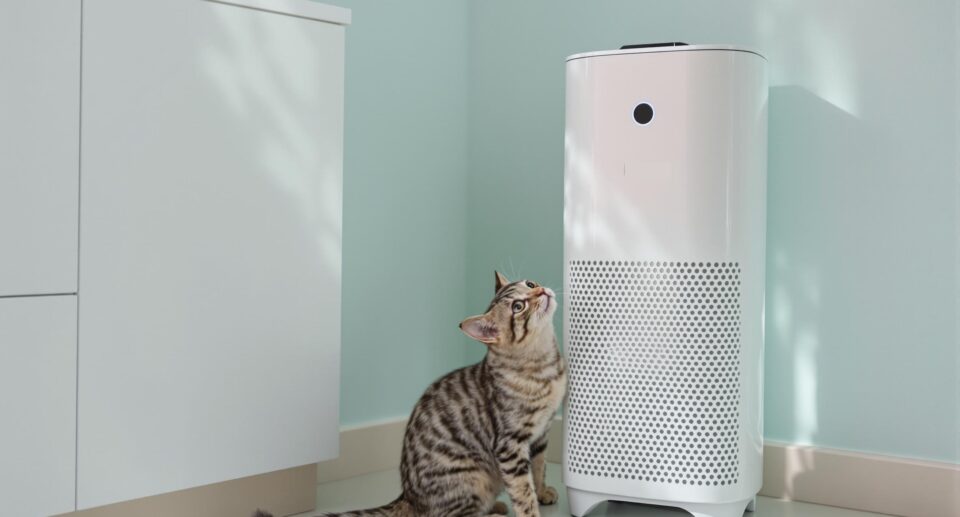Corneal Ulcers in Cats

What is a corneal ulcer or irritation?
Corneal ulcer or irritation in pets, also called keratitis, occurs when cells covering the clear outer surface of the eye, the cornea, are irritated or become infected. Wind, dust particles, your pet’s own hair, bacteria and viruses can irritate the cornea. A corneal ulcer, also called ulcerative keratitis, occurs when a non-healing sore develops in the clear cornea over the eye. Corneal irritation can progress to become a corneal ulcer if the eye isn’t treated.
What is the cornea?
The cornea is the first thing you see when you look into your pet’s eyes. It is a clear layer over the front of the eyeball. The cornea is 5-7 cells thick and is made of epithelial cells, rather like the skin. Also like the skin, corneal cells grow rapidly and are replaced rapidly. It takes about a week for new corneal cells to completely replace damaged cells. No blood vessels grow in a healthy cornea. The cornea relies on tears to bring oxygen and nutrients and remove waste. The cornea has nerve fibers, so it is very sensitive.
We underappreciate the cornea because we never notice it, but we look through it each time we look into our pets’ eyes and see a colored iris and dark pupil.
Why is the cornea important?
The cornea is the part of the eye almost always affected by disease. For example, glaucoma, foreign bodies, infections within the eye (toxoplasmosis, herpes) or anywhere within the body, affect the cornea.
Key facts about corneal ulcers in dogs and cats
- Corneal irritation can progress to corneal ulcer
- Corneal ulcers can progress to blindness
- You should never use eye medications with steroids to treat corneal ulcers
How serious is my pet’s corneal irritation?
A corneal irritation is painful. Without treatment, an irritated cornea can become infected, ulcerate, and cause blindness. However, if treated promptly, a corneal irritation can heal within a week.
What happens if dirt or a foreign body scratches the cornea?
Anything other than tears—grass awns, grit, eye lashes—that slides under the eyelids can scratch the cornea. Your pet’s eye may automatically respond by making tears to flush out the foreign material. And your pet may rub his or her eye because it hurts. The eye becomes inflamed and white blood cells rush to help out. While inflammation in many parts of the body is helpful, inflammation in the eye can cause permanent damage. Your veterinarian will work with you to stop the inflammation.
On your way to the veterinary clinic, soothe your pet’s eye with a cold, damp cloth or cool, moistened tea bag. If your pet is anxious, give a homeopathic anxiety medication, which will not interfere with any other medication your pet is taking, and will not interfere with an anesthetic—if that is necessary. We recommend HomeoPet Anxiety Relief for anxiety, and oral T-Relief, a homeopathic medication that stimulates the eye to immediately begin healing naturally.
What happens when the cornea becomes cloudy?
The cornea is normally clear because it is made of cells arranged in a neat, linear structure. When your pet’s cornea is damaged, the cell membranes lose the ability to keep out water and the cells swell and become cloudy. Corneal cells can absorb enough water to be four times their original thickness. Swollen and damaged cells may not be able to maintain their linear structure and the crisscrossing of new cells creates cloudy scarring. Inflammation of the cornea is called keratitis. If the inflammation doesn’t cause permanent damage, the cornea heals and remains clear. With permanent damage, the cornea may be scarred, covered with pigment, or infiltrated by blood vessels.
Eye inflammation (red or pink eye) for other reasons
Corneal irritation is not the only cause of pink or red eyes. Allergies also commonly cause this irritation. Rather than damaging the cornea, allergies stimulate inflammation in the conjunctiva, the thin mucous membrane on the inside of the eyelids. Conjunctivitis (pink eye), like corneal irritation, responds to a cold, damp cloth, but for the inflammation to resolve, your pet needs an environment free of allergens. Because the allergens can be inhaled or ingested, work with your holistic veterinarian to determine the cause. Your veterinarian may recommend a novel diet, Omega 3 fatty acids, an air filter, homeopathic eye drops, antihistamines, or topical steroids.
Pets with bulging eyeballs – exposure keratitis
If your pet’s eyelids do not close over his or her eyes, the cornea can dry out leading to keratitis, inflammation of the cornea. Pets with flat noses and bulging eyes (brachycephalic) are predisposed to exposure keratitis.
Exposure keratitis is different from an eye infection or foreign body in the eye. Pets with exposure keratitis do not have pink eyes, blink, or squint like pets with painful or infected eyes.
Work with your veterinarian to examine your pet’s eyes to make sure the lids close properly. Observe your pet while he or she sleeps. Even though the lids may close normally, they may not cover your pet’s eyes while sleeping. Your veterinarian will also check that your pet makes enough tears. If your pet doesn’t make sufficient tears, your veterinarian will treat your pet for dry eyes (KCS or keratoconjunctivitis sicca). For exposure keratitis, your veterinarian may recommend a topical lubricant.
Pets that ride with their heads out the window in moving cars are at risk for developing corneal irritation. If your pet rides in the car with his or her head out the window, protect the eyes with goggles. Working and hunting breeds who traverse through high brush and grass are also at risk for corneal irritation and foreign bodies. Dogs and cats with flat noses and bulging eyes (brachycephalic) are predisposed to exposure keratitis because their eyelids do not always protect their eyes completely. Examples of brachycephalic dogs are the Boxer, Bulldog, Pekingese, Boston Terrier, and Pug. Examples of cats with flat noses and bulging eyes are the Persian and Himalayan.





